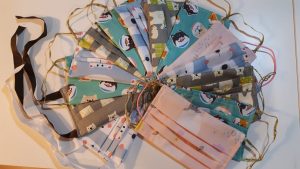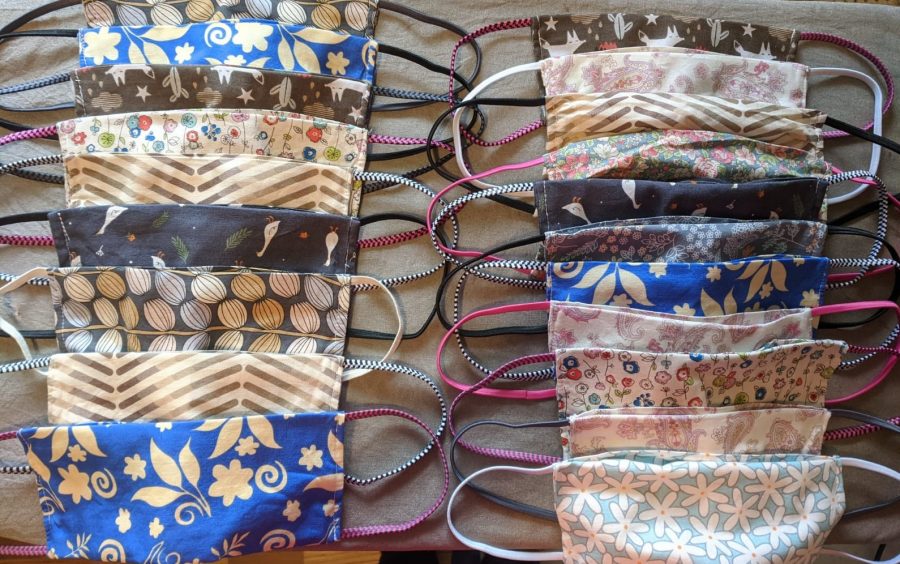Surrey-based DIVERSEcity Community Resources Society is donating $1,000 to the Intercultural Women’s Maker Society’s Cloth Facemask Initiative
A group of immigrant women are working together to sew cloth facemasks to help in the COVID-19 pandemic.
Clara, Wendy, Rosey, Masoomeh, Bekhita, Digna and Shiva are members of a sewing business collective called Sewmates Craft, which is part of the Intercultural Women’s Maker Society.
The entrepreneurial seamstresses first came together in October 2018 through the Make It! Sewing Business Program, delivered jointly as a pilot program by Vancouver Community College (VCC) and DIVERSEcity Community Resources Society’s Immigrant Entrepreneur Program with funding by Immigration, Refugees and Citizenship Canada (IRCC).
After courses in communication, business and sewing skills, the women joined together to start producing an original collection of handmade bags and accessories under the business name Sewmates Craft.
Florence Kao, an employment specialist with DIVERSEcity Community Resources Society’s Immigrant Entrepreneur Program, drew on both her professional experience and hobby sewing skills to help launch Sewmates and the broader Intercultural Women’s Maker Society. The society today supports women with diverse cultural backgrounds in improving their skills, expanding social networks, and gaining self-confidence and independence through maker-based entrepreneurial activities such as sewing and cooking.
“Empowering immigrant women to become self-employed is a passion of mine,” says Florence. “And I couldn’t be prouder of this amazing group of women, who come from different cultural backgrounds, for using their sewing skills for the greater good in these difficult times.”
Their Cloth Facemask Initiative came together within days after the women had their first virtual team meeting on March 25. “With our cultural backgrounds, we understand that wearing masks is a common protection in most Asian countries,” says Clara. “We were so worried about the emerging situation and some of our members kept mentioning this idea of sewing masks.”
Wendy adds: “So we held a motion during our Zoom meeting to use our skills to donate our time and do something good for the community. We all voted ‘Yes’ that we should do this!”
Research was done, their sewing machines came out, patterns were created and the women started sewing masks — each from their individual homes.
While these masks are not replacements for surgical or N95 masks, which are in extremely high-demand for health care workers, such cloth masks are gaining popularity globally. According to BC Centre for Disease Control (April 4, 2020), the virus is transmitted via droplets when an infected person coughs or sneezes. A mask can act as a barrier to help keep a person’s droplets in. On April 6, 2020, Canada’s chief public health officer Dr. Theresa Tam stated that wearing a non-medical mask can help stop the spread of COVID-19, in tandem with social distancing. While the science isn’t certain, Tam says a non-medical mask can reduce the chance of a person’s respiratory droplets coming into contact with others or landing on surfaces.
The Intercultural Women’s Maker Society’s sewing collective has already made their first 100 cloth facemasks, which are being donated to Mission Possible, a community economic development agency in Vancouver’s Downtown Eastside, and other organizations in the DTES. These 100 masks will be delivered on Tuesday, April 7, 2020, for distribution among the homeless in the community.
With Florence’s help, their plan now is to call for donations so they can sew and deliver masks to vulnerable communities and those in need who wouldn’t have access to the medical grade masks.
“We are hoping to leverage the initiative to do some fundraising for another 1,000 to 2,000 cloth facemasks,” says Florence. “We are now inviting people to sponsor donations of masks to designated care home facilities and/or homeless shelters.”
A $500 donation will allow them to make 100 cloth facemasks; $300 donation for 60 and $200 for 40.
Surrey-based DIVERSEcity Community Resources Society is donating $1,000 to the initiative, which means 200 masks that will be donated to DIVERSEcity clients as well as vulnerable populations in Surrey, BC through the Lookout Society.
“At DIVERSEcity, we’re continuing to support immigrants, refugees and vulnerable populations in Surrey, BC, during this global pandemic, and sponsoring 200 cloth masks to distribute among them is something we are proud to do,” said Neelam Sahota, CEO of DIVERSEcity Community Resources Society.
“We are all trying to do our part in supporting the most vulnerable in our communities in these challenging times, and I applaud the initiative and compassion of DIVERSEcity’s Florence Kao and the immigrant women behind Sewmates Craft. What started as a small pilot program has turned into an inspirational example of what can happen when we support newcomers, who often face countless barriers and discrimination, to become contributing members of our communities. Not only have these immigrant women achieved personal triumphs as a part of Sewmates, but they are now giving back to Canadians of all cultures and backgrounds, showing that we are truly all in this together.”
“Our sincerest thanks to DIVERSEcity Community Resources Society and the IWMS Intercultural Women’s Maker Society for making the cloth masks, a donation to Lookout Society,” said Shayne Williams, CEO of Lookout Society. “Their amazing generosity is helping to protect the lives of Lookout employees and the vulnerable people we serve.”
Any British Columbian interested in purchasing facemasks for themselves can also do so, with a minimum purchase of 10 masks at a cost of $125 plus delivery fee. For every 10 masks sold, an additional five will be donated to those in need via Mission Possible.
“[This is] certainly a great legacy of the Make It! Project,” says Michael Yue, VCC’s manager of partnership development.
Please see the Cloth Facemask Initiative’s online store to donate or order at https://my-site-iwms.square.site/.
For more information, you can see the flyer here or contact Florence Kao of DIVERSEcity at fkao@dcrs.ca or Michael Yue of VCC at myue@vcc.ca.
 NOTES ON USING THE SEWMATES CLOTH FACEMASK
NOTES ON USING THE SEWMATES CLOTH FACEMASK
This cloth mask is not meant to be used instead of a medically certified, surgical or N95 mask.
- Wash your hands well in soap and water before you put the mask on.
- Before you use the mask, insert a piece of non-woven fabric (not T-shirt material) as a filter, e.g. dry baby wipes between the two layers.
- Make sure the mask covers your mouth and nose. Avoid touching the mask or your face when wearing it.
- Wash the mask (including the inner layer you added) in soap and hot water and sterilize it with 75% alcohol spray when you take it off so it will be ready to use again.
Although wearing a cloth mask will not prevent you from acquiring the COVID-19 virus, it may help to slow the spread if you use one when you are coughing or not feeling well. Any mask, no matter how efficient at filtration or how good the seal, will have minimal effect if it is not used together with other preventive measures, such as hand washing and physical distancing.

